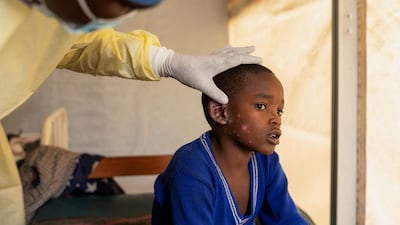One consequence of the Covid-19 pandemic was that the World Health Organisation, previously a body of interest mainly to doctors, policymakers and diplomats, was catapulted into the global public consciousness. As humanity faced collective danger, the WHO’s pronouncements were followed avidly by ordinary people across the world during the pandemic.
As a result, when the WHO speaks, people listen. On Wednesday, its director general, Dr Tedros Adhanom Ghebreyesus, confirmed that an outbreak of a new strain of the mpox virus in the Democratic Republic of the Congo and neighbouring countries has been classified as a public health emergency. Mpox is a dangerous virus that can cause fever, swelling of the lymph nodes, pain and skin lesions. In some cases, it can be fatal, especially to children.
Although we have been here before – the WHO declared another mpox emergency in July 2022 – there are worrying indications that this outbreak could be different. Speaking in early July as more information about this new strain – called clade 1b – emerged, Prof David Heymann of the London School of Hygiene and Tropical Medicine warned that the virus had an estimated mortality rate of 10 per cent, much higher than the 1.4 per cent mortality rate for Covid-19 in New York City. The strain was behaving differently too, Prof Heymann added, with human-to-human transmission posing a “great risk” to younger populations born since smallpox vaccination was discontinued.
Although it is important not to be alarmist – Covid and mpox are very different illnesses – a failure to act decisively could have serious consequences for global health. Already, senior WHO figures are warning against complacency. One such expert – Prof Dimie Ogoina – this week described the current wave of mpox infections as “an emergency, not only for Africa, but for the entire globe” and blamed previous neglect for contributing to 2022’s global outbreak.
In the battle against infectious disease, it is vital that governments and global healthcare bodies follow the science. Sadly, many unhelpful misconceptions surround mpox. An earlier variant was spread largely among men who have sexual contact with other men, but that is no longer the case. Nor is the virus destined to be confined to sub-Saharan Africa. Allowing these notions to breed complacency would be a repeat of mistakes made in the 1980s, when HIV/Aids was identified.
The WHO has previously warned of the dangers that accompany such attitudes. Speaking during the previous global mpox emergency in 2022, Meg Doherty, the organisation’s global director for HIV, Hepatitis and STI Programmes, said the WHO had “learned over the 40 years of the HIV response that stigma and discrimination are critical barriers to equitable access to prevention, treatment and care”.
Indeed, the focus should now be on a co-ordinated international approach to help the infected and prevent the disease from spreading further. The WHO has said $15 million in immediate funding is needed to support surveillance, preparedness and response activities. Underlining this urgency is that fact that some experts think the true number of mpox infections is much higher than official totals due to unreported cases.
Humanity learned much from the painful experience of the Covid years. If those harsh lessons are to be put to good use, a fitting place to start is in ensuring that other threats to global health – such as mpox – are nipped in the bud.


